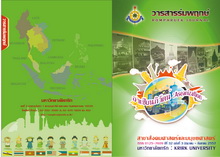ความตระหนักในการอุดมศึกษาด้านเทคโนโลยีสารสนเทศกับจริยธรรมที่เกี่ยวข้อง เพื่อการเติบโตอย่างยั่งยืนร่วมกับประชาคมเศรษฐกิจอาเซียนบวกสาม
Main Article Content
Abstract
Awareness of IT Education and Ethical Concern in Higher Education for Sustainable Growth with AEC Plus Three
The establishment of an ASEAN Economic Community (AEC) by 2015 offers great opportunities to support growth of ASEAN countries based on the region’s full economic integration. A free flow of goods, services, foreign direct investment, skilled labor, and freer flow of cross-border capital will be promoted. The community is closely intertwined and mutually reinforcing for the purpose of ensuring durable peace, stability, and shared prosperity in the region. It promotes tolerance, respect for diversity, equality, mutual understanding, and people-oriented in which all sectors of society, regardless of gender, race, religion, language, or social and cultural background, are encouraged to participate in, and benefit from the process of ASEAN integration and community building. The economic cooperation is deepening and widening through greater integration with China, Japan, and South Korea - the three partners from the north. The increasing globalization of the world economies is being fueled by a number of Information Technology (IT) infrastructures and applications. There are new forms of ethical problem arising out of this advancement in IT. For achievement of the cooperation’s goals, economic, social and environmental factors must be jointly considered. Higher Education (HE) takes an important role in human resource development through their core activities of learning management because students at this level will be prepared to enter the labor market. Organizations require graduates not only with good knowledge and professional skill, but also ethical awareness for serving as valuable human resources to strengthen community. This article aims to focus on emerging ethical problem issues in the digital age and their impacts to APT member countries. Related literatures are reviewed to show APT’s awareness of computer ethics among situations in recent years. Practical cases of teaching ethics for IT students in Thai universities, including Thai-Nichi Institute of Technology, are discussed. It is recommended that ethical concern in IT education still needs more perception and promotion for sustainable growth with APT.
Article Details
Every article published in the Romphruek Journal of the Humanities and Social Sciences is the opinion and point of view of the authors. Thery're not the viewpoint of Krirk University or the editored department. Any part or all of the articles for pablication must be clearly cited.


